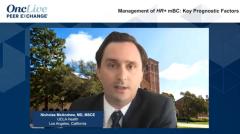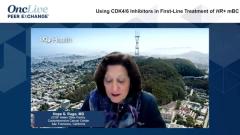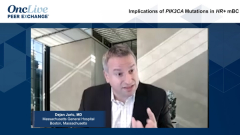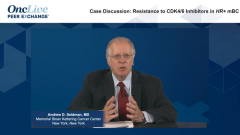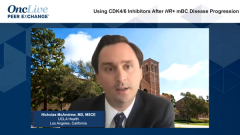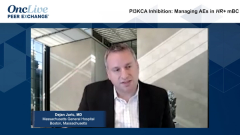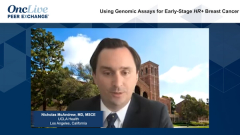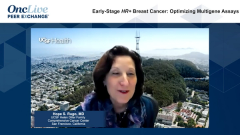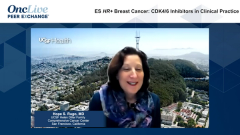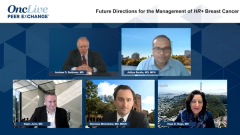
Selecting a CDK4/6 Inhibitor for HR+ mBC
Experts in breast cancer comment on the appropriate patient selection of CDK4/6 inhibitors for the management of HR-positive metastatic breast cancer.
Episodes in this series

Andrew D. Seidman, MD: Nick and Aditya, I wonder if you could weigh in on this. Once upon a time, we used to have Coke vs Pepsi trials, the paclitaxane story, the paclitaxel and docetaxel story, and the war of the aromatase inhibitors. In an era when we may lack comparative data between palbociclib, ribociclib, and abemaciclib, how do you parse this embarrassment of riches in terms of the differences in eligibility criteria or patient characteristics? Can you walk us through that? I’ll let Nick start.
Nicholas McAndrew, MD, MSCE: It’s a really good point. Hope brought up a great point as well in terms of the differences in eligibility criteria with these studies. While the data with palbociclib, in terms of prespecified overall survival end points, did not meet its overall survival end point, the subsequent analysis, exploratory analysis, as well as other interesting overall survival analyses looking at real-world evidence in the Flatiron database suggest that there is potentially overall survival benefit with palbociclib. It makes you more inclined to question whether these differences in survival that we’re seeing are primarily because of study design and inclusion of patients who weren’t included in the other trials.
I tend to focus on the fact that these drugs work in very similar ways. We know that they are different compounds—certainly because they have different adverse-effect profiles, and preclinical studies showed that they have differential impacts on CDK4 vs CDK6. But I completely agree that all the predictive biomarker studies haven’t identified a single patient who especially benefits or doesn’t benefit from the combination of these drugs. Given that we’re seeing that overall survival in the first-line setting does seem to be improved, we should be using this combination at first rather than in a sequential manner and waiting until later progression. As Dejan mentioned, that later progression may make you miss that window to give them a highly effective drug.
Andrew D. Seidman, MD: Yes. Dejan and Aditya, maybe you can weigh in on how differential toxicity, if you see any, may be a factor in patient selection for a specific CDK4/6 inhibitor.
Aditya Bardia, MD, MPH: Absolutely. Going back to what you were saying earlier about Coke and Pepsi: Both are carbonated drinks, but people have preference of 1 or the other. There are other factors to consider, such as access and finances. It’s a similar issue with CDK4/6 inhibitors. Ribociclib, palbociclib, and abemaciclib are all good agents. The decision to choose 1 over the other essentially boils down to patient preference in terms of the adverse effects, ease of access in terms of co-pays, and dose reduction.
If you talk about the toxicity profile, ribociclib and palbociclib tend to cause more myelosuppression, while abemaciclib tends to cause more diarrhea. From a dose-reduction perspective with palbociclib, you have to change pills from 125 to 100 mg if someone needs dose reduction. It’s another call to the insurance company and getting the new supply of 100 pills. With ribociclib, you start with 3 pills, and if someone has adverse effects, you can go down to 2 pills. There’s a convenience factor that’s built in. Finally, it’s physician experience. Because palbociclib was approved first, physicians in general, particularly in the community, have more experience with palbociclib. It’s all these factors that come into the decision-making: adverse effects, ease of access, patient and provider preference.
Hope S. Rugo, MD: Could I ask a quick question for everybody? There have been some comments, even at the ASCO [American Society of Clinical Oncology] discussion, about differences in the blockade of CDK4 vs CDK6 and things like that. I totally agree with what Aditya said about the access. Another thing to consider, which I recently ran into, was Medicare patients having to pay their share of cost on each drug. If you got a 150 mg and a 100 mg, you’d have to pay twice as opposed to once, which is ridiculous of our health care system. I’m really interested in what everybody thinks about this difference in CDK4 inhibition and whether that plays a role in your decisions to use 1 drug vs another.
Dejan Juric, MD: Speaking of boxing, this could be a boxing match. My view is that these drugs are actually different. They have different chemical structures. They have different target inhibition profiles. They have different adverse effects. While some outcomes are the same, some outcomes aren’t. We’re going to discuss early stage disease later, but this is where a can of worms is open: when you start comparing drugs and metastatic vs early stage disease.
Top-line data from all these studies show, at least when you look at the ratio for progression-free survival, that they seem to be the same. But that’s not the only outcome we care about. We care about other outcomes, such as overall survival, long-term responders, and toxicities. My view is that instead of extrapolating, we simply use the data we have in that patient population. If I have a premenopausal patient, I’m prescribing ribociclib. If I’m interested in a patient who has primary endocrine-resistant breast cancer, a high visceral disease burden where ER [estrogen receptor] and PR [progesterone receptor] status are questioned in terms of their amount or positivity, and I’m not worried about GI [gastrointestinal] toxicity, then I really like abemaciclib.
We have to pay attention to where the primary data were generated. When we have the data in that patient population, my preference is to use the drug from that particular trial and setting. The discussion about class vs specific drug is really important for PI3 kinase inhibitors. We have gone through 4 generations of PI3 kinase inhibitors. We call them all PI3 kinase inhibitors, but only 1 of them has been approved so far because it had a PI3 kinase alpha inhibition as the dominant target. Hope, to go back to your question about whether CDK4 vs CDK6 matters, I think so. Breast cancers tend to be really dependent primarily on CDK4, at least initially, and palbociclib is equipotent there, while the other 2 drugs preferentially hit CDK4. That may not necessarily come into play initially in the first readouts of these trials, but they may play a role as you start looking at a longer effect or more distant clinical end points.
Andrew D. Seidman, MD: These are great points. They may have different implications in the early stage setting and in the metastatic setting, and we’ll absolutely come back to that.
TRANSCRIPT EDITED FOR CLARITY


